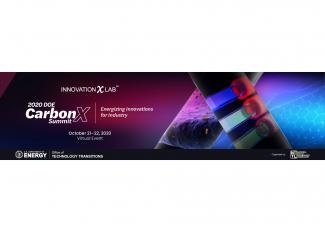With topics ranging from artificial intelligence and machine learning to commercialization pathways for new innovations and projections of the future for the natural gas industry, the U.S. Department of Energy (DOE) InnovationXLab CarbonX Summit hosted by NETL showcased DOE technologies and the national laboratories’ capabilities at the heart of the domestic energy economy.
The second day of the CarbonX Summit, featuring the “Carbon in the Digital Era: Artificial Intelligence and Machine Learning” panel, brought together representatives of industry, academia and DOE’s national laboratories to examine the impact of sophisticated computational technologies on future energy production and manufacturing in the United States.
Securing reliable and affordable energy while addressing greenhouse gas emissions is NETL’s mission and was addressed at CarbonX by the panel “Carbon Capture, Utilization, and Sequestration.” This panel featured some of the top minds from the nation’s energy sector and national labs such as Ben Bloys, strategic planning and business manager for Chevron Energy Technology Company, Richard Esposito, R&D program manager for Southern Company, Scott Chen, president and CEO Carbon Capture Scientific, LLC and Marc Witkowski, alliance manager for business development at Los Alamos National Laboratory.
Together, they demonstrated how carbon dioxide (CO2) can be transformed into commercial uses such as utilizing CO2 captured from power generation for enhanced oil recovery or in the production of chemicals and fuels. By connecting the in-field commercial experiences of private sector industries with technological know-how of DOE’s labs, lowering CO2 emissions while making full use of the country’s abundant carbon resources can lead not only to a cleaner environment but a more robust economy.
As modern economies increasingly go high-tech and require more energy than ever before, new challenges regarding affordable power while maintaining environmental integrity are created, but new technologies from DOE national labs and their partners can provide solutions. NETL Director Brian Anderson said he was inspired by the innovations discussed and the promise demonstrated by the DOE Laboratories and industry coming together to use science and technology to solve some of our greatest energy challenges.
“I believe it is more important than ever for the public and private sectors to engage, exchange ideas and cooperate to create the technology that will enhance the economic prosperity of our nation. The CarbonX Summit did just that,” Anderson said. “Advances in artificial intelligence and carbon capture, utilization and sequestration will improve our energy systems as we continue to serve the public. I anticipate significant impacts on the energy sector from the new innovations developed through partnerships between the DOE, the national laboratories and industry partners.”
The CarbonX Summit marked the seventh in the InnovationXLab Series designed to showcase the remarkable assets of DOE’s national laboratories. InnovationXLab summits facilitate a two-way exchange of information and ideas between industry, universities, manufacturers, investors and end-use customers with innovators and experts from across the national laboratories and broader DOE research and development complex.
More information on InnovationXLab CarbonX Summit can be viewed here.
NETL is a U.S. Department of Energy national laboratory that produces technological solutions for America’s energy challenges. From developing creative innovations and efficient energy systems that make coal more competitive, to advancing technologies that enhance oil and natural gas extraction and transmission processes, NETL research is providing breakthroughs and discoveries that support domestic energy initiatives, stimulate a growing economy, and improve the health, safety, and security of all Americans. Highly skilled men and women at NETL’s sites in Albany, Oregon; Anchorage, Alaska; Houston, Texas; Morgantown, West Virginia; and Pittsburgh, Pennsylvania conduct a broad range of research activities that support DOE’s mission to advance the national, economic, and energy security of the United States.




